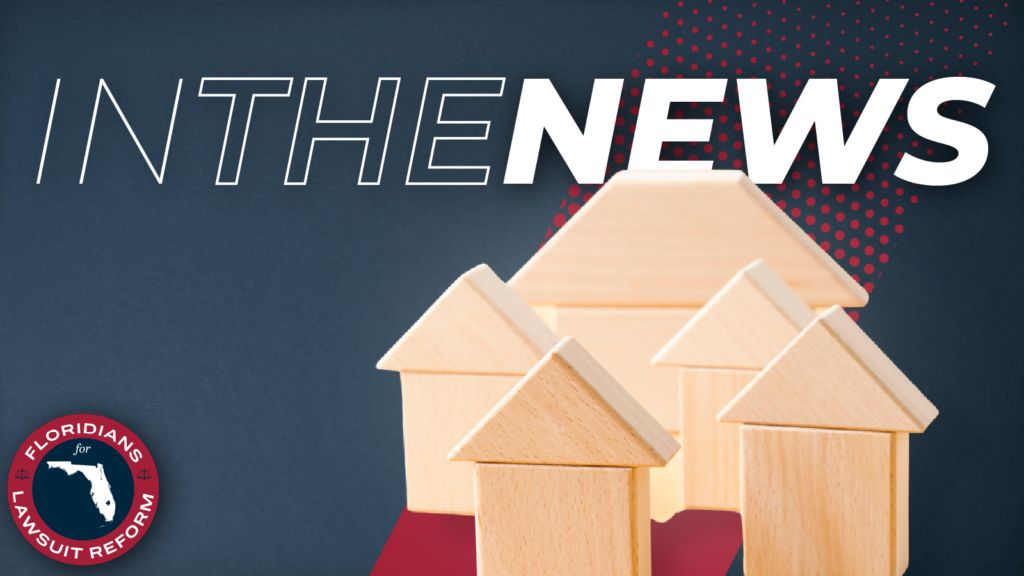
This past week, I watched as The Florida Senate Committee on Banking and Insurance gathered for its first meeting ahead of the 2022 session. David Altmaier, commissioner of the Florida Office of Insurance Regulation, and Tasha Carter, Florida Insurance Consumer Advocate, presented a bleak picture of Florida’s insurance marketplace to the committee. While it’s too soon to measure the impact that legislation passed earlier this year will have on healing the market, there is one thing that’s certain – Florida homeowners are hurting. “Consumers are on life support right now,” remarked Carter, when asked by Senator Jeff Brandes how soon Florida’s homeowners would feel the more dire effects of our state’s troubled insurance market. Fraudulent contractor solicitation is a real problem that harms homeowners and has resulted in higher insurance premiums and fewer coverage options.
Unfortunately, there are unscrupulous contractors and other vendors who chase catastrophic weather events, especially during hurricane season, to take advantage of vulnerable consumers under extreme stress. Senate Bill 76, passed by the legislature during the last session, included a number of excellent provisions to curb this bad practice.
And yet, in the summer, a federal judge granted an emergency injunction disallowing a portion of SB 76 that prohibited certain types of contractor advertising – ads that were meant to confuse homeowners, offering a service that these contractors are not allowed or qualified to provide – support with filing and adjusting roof claims.
Gale Force Roofing & Restoration, a Tampa Bay-area contractor, filed for the emergency injunction on SB 76, claiming a new provision within the law violates their First Amendment commercial free speech rights. Since when is targeting storm victims, while offering an illegal service, considered protected free speech?
Under SB 76, contractors are still free to advertise for their qualified services and provide quotes for needed repairs. The section being debated prevents unscrupulous contractors from descending on vulnerable neighborhoods and consumers affected by catastrophic weather events, looking for them to sign over their insurance benefits and rights to a door-knocking stranger. Only licensed public insurance adjusters and lawyers are licensed and insured to solicit, adjust, and negotiate insurance claims on behalf of policyholders – a process that requires continuous training and in-depth understanding of increasingly complex insurance contracts, and which is highly regulated as a matter of good public policy.
I thank the Florida Department of Business and Professional Regulation for defending against the tenuous Gale Force claim that SB 76 infringes on their protected commercial free speech. Fortunately, most of SB 76 remains enforceable to prevent contractors from engaging in fraudulent practices such as offering upfront “financial inducements” to conduct roof inspections or claiming the authority to solicit, adjust and negotiate claims with insurance companies. These actions unfairly drive up the costs of insurance and have significantly contributed to the growing insurance crisis in our state.
With the court blocking this provision of the law from taking effect until it can rule on the case (a trial is currently set for May 2022), it is important for homeowners to watch out for warning signs from potential scam artists throughout hurricane season and beyond:
Business cards from a “loss consultant” or a representative of an “inspection and insurance division”;
- Offers to secure a “free roof” from your insurance company or a rebate on your deductible;
- Offers for a financial kickback to file a claim or a payment, in return for allowing someone to inspect your home for damage – whether from a contractor or any other entity; and,
- A roofing company or construction contractor offering to directly file your insurance claim.
Remember that these are all illegal!
If a contractor comes to your home unsolicited, that is a major red flag. Consumers that have seen contractors interpreting their insurance policies or offering to provide insurance claim advice should report the incident to the Florida Department of Financial Services Division of Investigative and Forensic Services. Additionally, you can share your story at VoicesofPolicyholders.com. The Florida Association of Public Insurance Adjusters can also help you to identify a licensed public adjuster in your area.
Preparing before a storm is key to protecting our homes and families. Being vigilant after sustaining storm damage is nearly as important.
